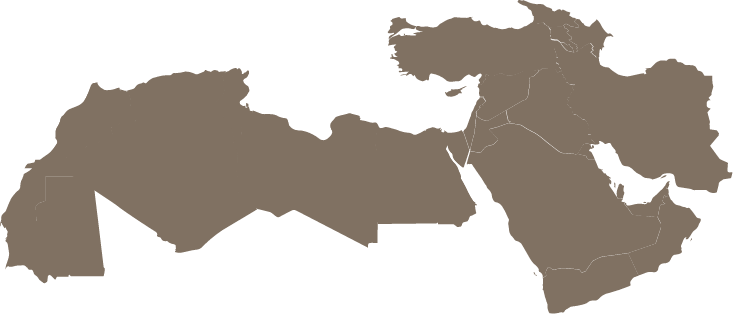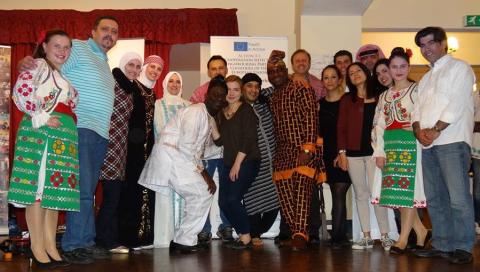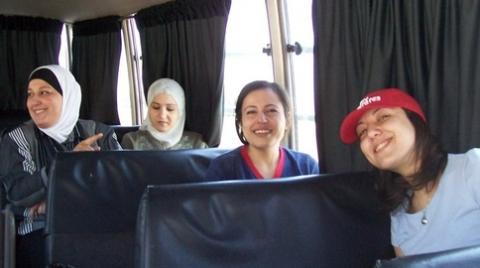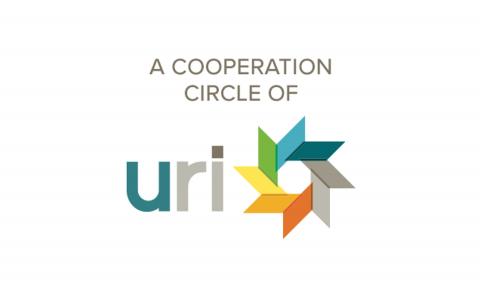In honoring World Interfaith Harmony Week (WIHW), URI MENA Cultural Café organized a two-hour workshop on the 22nd of February on "The Religions' Contribution to Society." The workshop was attended by fifteen participants from different religious background and countries (Muslim, Christian, and Bahá'í from Jordan, South Africa, Germany, the USA, and Italy). Most of the Jordanian participants were from Naya, Desert Bloom, Mercy and Jordan Seeds of Peace CCs.
At the beginning, Mamoun Ahmad (the URI Regional Coordinator) distributed information about the Golden Rule (treat others and the planet as you would wish to be treated) and encouraged participants to promote the ideas. Then Francesco reflected on WIHW and introduced Ms. Kari Morse and gave her the floor to reflect on the role of Christianity in society. Kari, who is from the USA, highlighted the role of Christianity's teachings in serving society and providing solutions to social challenges. She shared her experience with two Christian organizations: First, she talked about Seattle's Union Gospel Mission (the US arm of the international organization Union Gospel Mission, which is a Christian charitable organization providing meals, education, shelter, safe and affordable housing, drug and alcohol recovery programs, and support services to those struggling with homelessness and addiction). She shared the below video about Union Gospel Mission.
Second, Kari talked about World Relief Seattle (World Relief is an international Christian relief and development organization whose US arm represents one of the largest refugee and immigrant-serving ministries in the United States). Kari shared her experience in building a Refugee & Community Garden. The below video summarizes this project.
The participants shared examples of how their religious teachings urge social cohesion that helps maintain social solidarity and enforce religious-based morals and norms to maintain conformity and control in society. The participants agree on the notion that religion is a major player in social cohesion.
Below are some good takeaways from participants’ contributions:
- If we dig deep in our religious traditions, we find that they are coming from the same source. Charity is a strong tradition in all faiths. In both Christianity and Islam, giving alms in secret is better than receiving human praise for the practice.
- Charity in all religious traditions is not just almsgiving, and should not be seen only as an obligation or duty. Charity is love and generosity towards humanity.
- Spending money on others and providing services to others makes us happier.
- Muslims highlighted the concept of charity in Islam, which is called Zakat, as the Third Pillar of Islam and a major teaching. In Islam, there are two main charities; zakat (obligatory charity) and sadaqa (voluntary charity). Zakat is a specific, standardized percentage of one’s extra wealth (over and above the necessities of life) that must be given to the poor and those in need. Sadaqa can be given to anyone in many forms including a smile, wise advice, giving your time or your talents, providing food and clothes, shelter, services, helping in building a home or masjid, and removing troublesome things like thorns and bones from the road. Charity serves as a way to bring justice, balance and kindness to society. Being charitable and providing for the needy are important features of the Muslim character.
- Islam fosters community resilience and solidarity; the strongest ties that can be achieved between people are the ties of Islam. It is stronger than blood relationships, ethnic origins and nationality bonds.
- In Islamic traditions, collectivism prevails in terms of religious-driven actions, while in Western societies, the individualist mood is more common.
- What matters about religion is touching the heart and considering that we are all humans sharing humanity and we come from same root.
- The Middle East enjoys a unique example of a long history of living in peace and harmony. There are many tribes which could have believers belonging to different faiths. Currently, the Christians in Jordan are around 3%, and they enjoy equal rights with the Muslim majority. They practice their rituals freely.
- The Bahá'í concept of charity and service is dedicated to the well-being of the world. They focus on building the capacity of the community to enhance people's lives.
Francesco shared some religious traditions in Italy. He presented the below videos about interfaith harmony in Italy.



